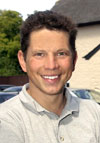| Equine
sports Injuries and Rehabilitation

Andy Bathe.
Internationally-renowned veterinarian, Andy Bathe, who is a partner in the Newmarket equine practice of Rossdale & Partners, educated and entertained an audience of about 100 people, including many of the area's leading equestrian personalities, at Nottingham Trent University's Brackenhurst Campus on the evening of 15 th February. His main areas of expertise lie in orthopaedic surgery and lameness, especially in the competition horse, and he shared his thoughts and knowledge with the audience in a way that was easy to understand, though fairly technical at times.
During the course of the lecture, Andy reviewed cases and showed videos discussing diagnosis and demonstrating that correct rehabilitation is critical to a positive outcome when treating lameness. He stressed that early, accurate diagnosis is the key to success.
Clients usually bring horses to him for diagnosis and treatment of either lameness, poor performance or schooling/behavioural problems. When a horse is first presented to him, he starts by discussing the history of the case with the owner, followed by a clinical examination, lungeing on both hard and soft surfaces and a ridden examination. Further clinical examination might involve a variety of techniques including X-rays and thermal imaging and nerve blocks can be very useful in diagnosing where the problem lies.
The importance of a balanced foot and correct shoeing in keeping a competition horse sound was stressed. Andy then outlined different treatments, including shockwave treatment, surgery (including keyhole surgery) and injection of various substances such as Adequan and Hyonate into the joint involved. Physiotherapy and massage can be beneficial after treatment. The importance of a well-fitting saddle was highlighted and Andy wasn't keen on the use of pads.
After summing up the basics of how to keep your horse fit and sound - start with good confirmation, bring on steadily, work on a variety of good surfaces, use a good farrier, trainer and vet and a well-fitting saddle - Andy said to treat problems early and, if all else fails, go ski-ing!
Among the interesting issues raised in the questions after the lecture was the amount of veterinary fees cover necessary when insuring these days. Andy recommended cover of between £5,000 and £6,000 to allow for the use of the many sophisticated techniques available nowadays.
The lecture marked the third in a most successful winter lecture series at Nottingham Trent University's Brackenhurst campus. The next lecture is to be held on Wednesday 18 th April 2007 with the guest speaker, Professor Derek Knottenbelt, who is renowned for his outstanding contribution to national and international equine medicine and welfare.
For more information and tickets, please contact Zoe Cobb on 01636 817026 or visit www.ntu.ac.uk/ares/equestrian_centre.
Return to Hoyland Event main site
|